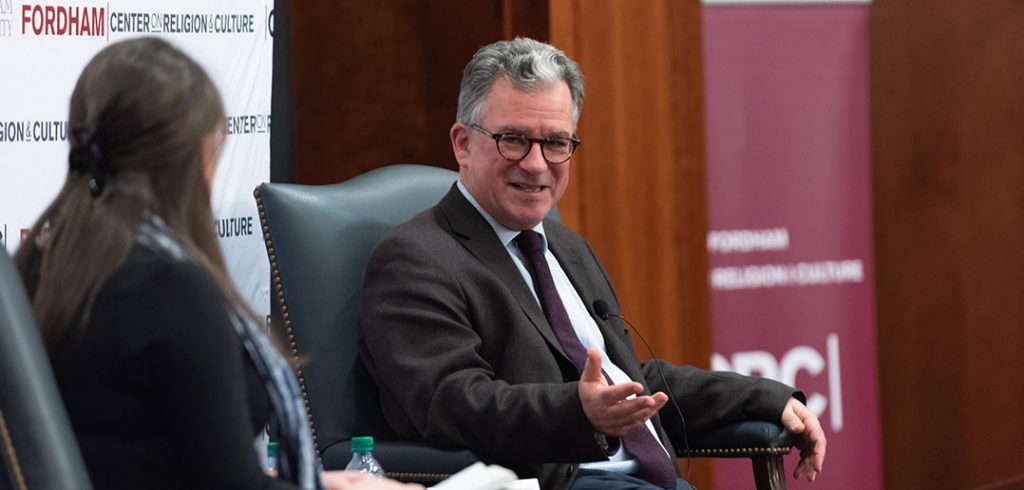This quotation, popularly attributed to Don Quixote, has become a favorite saying of Pope Francis as he confronts fierce opposition to his efforts to reform the Catholic Church, leading papal biographer Austen Ivereigh told a Fordham audience Nov. 4.
Ivereigh, a noted Catholic author and commentator and fellow in contemporary church history at Campion Hall, Oxford, reflected on the first seven years of Pope Francis’ pontificate and the antagonism it has inspired in a talk at Fordham’s Lincoln Center Campus. The event, titled “Pope Francis: Reform and Resistance,” was hosted by the Fordham Center on Religion and Culture.
The occasion also served as the U.S. launch of Ivereigh’s new book, Wounded Shepherd: Pope Francis and His Struggle to Convert the Catholic Church. Wounded Shepherd is Ivereigh’s second book on Pope Francis, following the 2015 biographical volume The Great Reformer: Francis and the Making of a Radical Pope.
“This one has a rather more humble title,” he acknowledged with a laugh. Ivereigh, who arrived at Fordham after spending the previous month in Rome, said that the book’s name is rooted in an essential message of Francis’ papacy.
“I saw Pope Francis just the other day to hand him the book, and I explained to him that the reason I had chosen the title was that he himself has spoken about how we need to be a church which shows its wounds,” Ivereigh said. “To be a church that embraces its wounds is to allow itself also to be healed by our savior.”
In Ivereigh’s view, Pope Francis’ most significant works—from his efforts to build a “synodal” church that listens to the voices of the faithful to his emphasis on selecting cardinals with pastoral priorities—have uniformly focused on drawing the church “closer to the wounds of humanity.”
“This is the heart, I believe, of Francis’ reform: to bring about a church whose whole way of evangelizing emulates the salvific action of coming close and walking alongside,” he said.
“The reform he’s carrying out is really a call to conversion,” Ivereigh continued. “And whenever you have conversion, you have resistance to conversion.”
In assessing opposition to Francis from within the church, Ivereigh drew a distinction between criticism, which he said the pope welcomes, and a malicious “hidden resistance” that has sought to undermine his papacy while feigning support.
Ivereigh noted the ferocious reactions of critics when Pope Francis washed the feet of Muslim refugees and visited migrants on the Greek island of Lesbos in 2016. Resistance, he said, “appears most vicious precisely at the moment the pope and pastors show forth the wounds of humanity and the wounds of the church and when they demonstrate the unconditional love and compassion of God for the whole of humanity.”
One of Pope Francis’ great ethical achievements, Ivereigh said, has been to demonstrate that two great questions of our time—namely, ecology and immigration—touch directly on the gospel. “To be Christian means to see in the migrant the wounds of Christ, not a threat to our wellbeing,” Ivereigh said. “To respect creation is not some lefty green thing, but essential for believers in a loving God who is incarnate in creation.”
In the United States, which is a hotbed of conservative opposition to Pope Francis, Ivereigh said, the pope’s stance on these issues has served to weaken the nexus between parts of the church and the American “political right-wing family values project.”
“Ethically, you can’t care about the destruction of unborn life in the womb without also caring about the destruction of the rainforest,” he said. “This is part of the same ethical idea, which is that all is the gift of God.”
Mary Kate Holman, a doctoral candidate and teaching fellow in the Fordham Department of Theology, led an audience discussion with Ivereigh following his talk. Holman questioned Ivereigh about the hybrid genre of his book, which blends biography, Vatican intrigue, and doctrinal discussion. “Between history, journalism, apologetics, where do you situate your work?” she asked.
Ivereigh characterized his Wounded Shepherd as narrative nonfiction and rejected criticism of his work as hagiographical. “I think my role is to explain and to provide a narrative account to this point which helps to understand how he thinks and what he’s doing—which for some people will not be critical enough, and I accept that,” he said.
Though Ivereigh offered a harsh assessment of Francis’ most strident opponents—characterizing their appeals to tradition as often being rooted in grievance and accusing them of practicing “a kind of post-truth theology”—he stressed the need for critical engagement across ideological lines. “We have to work out better ways of dialoguing,” he said. “We have to overcome the polarization in the church.”
“We must always win over opposition and resistance with love, just as Jesus pulled down Zacchaeus from the sycamore tree,” Ivereigh said. “That’s what we must do with the resistance to Francis.”
–Michael Garofalo

